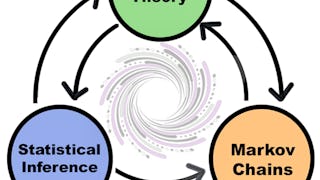- Browse
- Distributional Semantics
Results for "distributional+semantics"
 Status: Free TrialFree TrialS
Status: Free TrialFree TrialSStanford University
Skills you'll gain: Bayesian Network, Applied Machine Learning, Graph Theory, Machine Learning Algorithms, Probability Distribution, Network Model, Bayesian Statistics, Statistical Modeling, Markov Model, Decision Support Systems, Machine Learning, Probability & Statistics, Network Analysis, Machine Learning Methods, Statistical Inference, Sampling (Statistics), Statistical Methods, Algorithms, Model Evaluation, Computational Thinking
4.6·Rating, 4.6 out of 5 stars1.5K reviewsAdvanced · Specialization · 3 - 6 Months
 Status: Free TrialFree TrialS
Status: Free TrialFree TrialSStanford University
Skills you'll gain: Bayesian Network, Graph Theory, Probability Distribution, Network Model, Statistical Modeling, Markov Model, Decision Support Systems, Probability & Statistics, Network Analysis
4.6·Rating, 4.6 out of 5 stars1.4K reviewsAdvanced · Course · 1 - 3 Months
 Status: NewNewStatus: Free TrialFree TrialA
Status: NewNewStatus: Free TrialFree TrialAArizona State University
Skills you'll gain: Statistical Methods, Bayesian Statistics, Statistics, Probability & Statistics, Data Storage Technologies, Analytical Skills, Exploratory Data Analysis, Data Storage, Database Software, Estimation, Data-Driven Decision-Making, Applied Machine Learning, Supervised Learning, Markov Model, Logistic Regression, Statistical Hypothesis Testing, Predictive Modeling, Simulations, Simulation and Simulation Software, Regression Testing
Intermediate · Specialization · 3 - 6 Months
 Status: NewNewStatus: Free TrialFree TrialU
Status: NewNewStatus: Free TrialFree TrialUUniversity of Colorado Boulder
Skills you'll gain: Probability, Statistical Inference, Estimation, Statistical Methods, Probability & Statistics, Statistics, Probability Distribution, Markov Model, Data Literacy, Statistical Analysis, Sampling (Statistics), Bayesian Statistics, Applied Mathematics, Artificial Intelligence, Generative AI, Data Science, Theoretical Computer Science, Data Analysis, Machine Learning Algorithms, Mathematical Theory & Analysis
Build toward a degree
4.4·Rating, 4.4 out of 5 stars336 reviewsIntermediate · Specialization · 3 - 6 Months
 Status: Free TrialFree TrialU
Status: Free TrialFree TrialUUniversity of California, Santa Cruz
Skills you'll gain: Bayesian Statistics, Time Series Analysis and Forecasting, Statistical Inference, Statistical Methods, R Programming, Forecasting, Probability & Statistics, Statistical Modeling, Technical Communication, Data Presentation, Probability, Statistics, Statistical Software, Probability Distribution, Statistical Analysis, Data Analysis, Markov Model, Model Evaluation, R (Software), Data Science
4.6·Rating, 4.6 out of 5 stars3.5K reviewsIntermediate · Specialization · 3 - 6 Months
 Status: Free TrialFree Trial
Status: Free TrialFree TrialSkills you'll gain: PyTorch (Machine Learning Library), Large Language Modeling, Embeddings, Generative AI, Natural Language Processing, Transfer Learning, Recurrent Neural Networks (RNNs), Data Ethics, Artificial Neural Networks, Classification Algorithms, Model Evaluation, Data Preprocessing, Feature Engineering
4.4·Rating, 4.4 out of 5 stars181 reviewsIntermediate · Course · 1 - 4 Weeks
What brings you to Coursera today?
 Status: Free TrialFree Trial
Status: Free TrialFree TrialSkills you'll gain: Generative AI, Large Language Modeling, PyTorch (Machine Learning Library), Transfer Learning, Embeddings, Natural Language Processing, Text Mining, Applied Machine Learning, Performance Tuning
4.5·Rating, 4.5 out of 5 stars138 reviewsIntermediate · Course · 1 - 4 Weeks
 Status: Free TrialFree TrialU
Status: Free TrialFree TrialUUniversity of Colorado Boulder
Skills you'll gain: Probability, Statistical Hypothesis Testing, Statistical Inference, Statistical Methods, Probability & Statistics, Statistics, Probability Distribution, Data Literacy, Sampling (Statistics), Bayesian Statistics, Applied Mathematics, Data Ethics, Statistical Analysis, Quantitative Research, Data Science, Theoretical Computer Science, Data Analysis, Sample Size Determination, Descriptive Statistics, Artificial Intelligence
Build toward a degree
4.4·Rating, 4.4 out of 5 stars349 reviewsIntermediate · Specialization · 3 - 6 Months
 Status: Free TrialFree TrialJ
Status: Free TrialFree TrialJJohns Hopkins University
Skills you'll gain: Calculus, Applied Mathematics, Data Modeling, Estimation, Graphing, Mathematical Modeling, Numerical Analysis, Algebra, Mathematical Software, Engineering Calculations, Linear Algebra, Trigonometry, Operations Research, Data Analysis, Graphical Tools, Advanced Mathematics, Derivatives, Mathematical Theory & Analysis, Geometry
4.8·Rating, 4.8 out of 5 stars389 reviewsIntermediate · Specialization · 3 - 6 Months
 Status: Free TrialFree TrialL
Status: Free TrialFree TrialLLearnQuest
Skills you'll gain: Image Analysis, Exploratory Data Analysis, Time Series Analysis and Forecasting, Data Wrangling, Model Evaluation, Data Preprocessing, Operations Research, NumPy, Data Manipulation, Feature Engineering, Supervised Learning, Inventory Management System, Supply Chain, Applied Machine Learning, Trend Analysis, Data Visualization, Customer Demand Planning, Machine Learning, Data Science, Data Analysis
3.4·Rating, 3.4 out of 5 stars86 reviewsIntermediate · Specialization · 3 - 6 Months
 Status: Free TrialFree Trial
Status: Free TrialFree TrialSkills you'll gain: LangChain, Prompt Engineering, Large Language Modeling, Retrieval-Augmented Generation, Vector Databases, Tool Calling, Embeddings, OpenAI API, ChatGPT, Google Gemini, Agentic Workflows
4.3·Rating, 4.3 out of 5 stars24 reviewsBeginner · Course · 1 - 4 Weeks
 Status: Free TrialFree TrialS
Status: Free TrialFree TrialSStanford University
Skills you'll gain: Bayesian Network, Machine Learning Methods, Statistical Inference, Markov Model, Graph Theory, Sampling (Statistics), Applied Machine Learning, Statistical Methods, Probability & Statistics, Algorithms, Probability Distribution, Machine Learning Algorithms, Computational Thinking
4.6·Rating, 4.6 out of 5 stars488 reviewsAdvanced · Course · 1 - 3 Months
In summary, here are 10 of our most popular distributional+semantics courses
- Probabilistic Graphical Models: Stanford University
- Probabilistic Graphical Models 1: Representation: Stanford University
- Modern Statistics for Data-Driven Decision-Making: Arizona State University
- Foundations of Probability and Statistics: University of Colorado Boulder
- Bayesian Statistics: University of California, Santa Cruz
- Gen AI Foundational Models for NLP & Language Understanding: IBM
- Generative AI Language Modeling with Transformers: IBM
- Data Science Foundations: Statistical Inference: University of Colorado Boulder
- Differential Calculus through Data and Modeling: Johns Hopkins University
- Machine Learning for Supply Chains: LearnQuest










